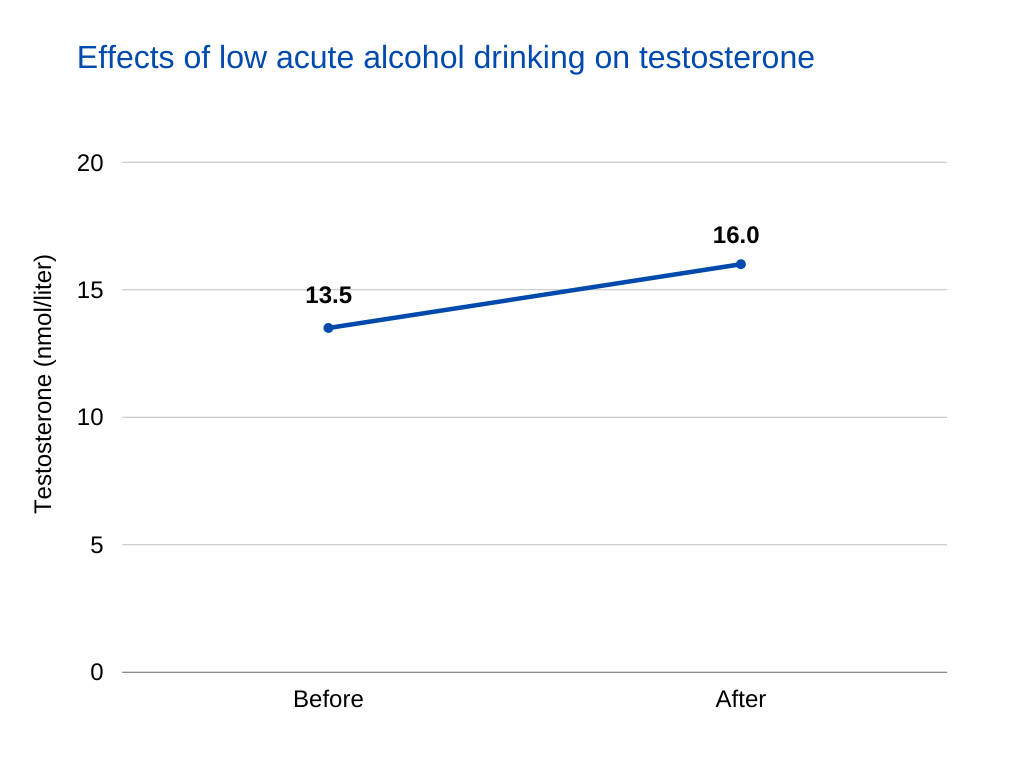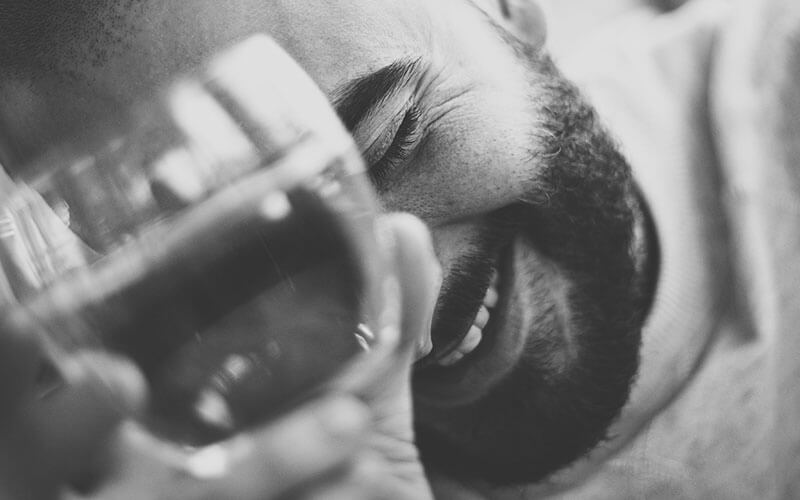Farrinstitute is reader-supported. We may receive commissions on purchases made through links on our site.
Alcohol only makes you think you’re more manly. A lot of people have a beer or glass of wine with dinner and with friends. However, the stereotypical heavy drinker is usually a young man trying to prove his masculinity or an older man cracking open a cold one after a day at work.
On a biochemical level, alcohol has a much different effect. In reality, the more you drink, the lower your testosterone levels are likely to be.
Alcohol can impact testosterone levels in two ways. With the first, you’re taking a drink or two, but not going further than moderate alcohol intake. The effect of that sort of acute alcohol consumption can increase testosterone [1]. However, excessive drinking can disrupt testosterone production.

Source: https://onlinelibrary.wiley.com/doi/10.1111/j.1530-0277.2003.tb04405.x
Alcohol impacts women more than it does men, so their levels of testosterone may be lowered further [2].
There are a couple of different ways to think about alcohol consumption. One is acute vs chronic, which describes drinking over a short period of time vs drinking habitually. The other is the amount of alcohol, either low amounts or large amounts.
Acute drinking of low amounts of alcohol, drinking a small amount over a short period of time, can actually lead to an increase in testosterone in men and women. It’s not clear why that happens, though it might have something to do with alcohol’s impact on the liver.
Chronic use of heavy amounts of alcohol, on the other hand, can seriously, negatively impact testosterone levels in everybody [3]. Obviously, alcohol abuse is bad for you in many ways. Alcohol is toxic in some contexts, after all. Heavy use means you’re overloading your body’s ability to deal with the alcohol.
Testosterone is the male sex hormone, so testosterone in men is bound up intimately with sexual health. Both testosterone and sperm development are made in Leydig cells in the testes.
Alcohol can interrupt hormone production in the endocrine system, including follicle-stimulating hormones and luteinizing hormones, which causes the testes to synthesize testosterone. Any substance that has an effect on testosterone production will also have an effect on sperm production and the male reproductive system.
Alcohol also may be linked to erection problems, more technically called erectile dysfunction (ED) and other sorts of sexual dysfunction [4]. Some studies have found that alcohol reduces the risk of erectile dysfunction. However, alcohol may indirectly affect sexual function due to its effect on general health issues, including raising the risk of heart disease, bone loss, and kidney disease.

Alcohol is one of the worst foods that kill testosterone. It doesn’t affect the testosterone that has already been synthesized. Instead, it prevents new testosterone from being made in a few ways, including:
Heavy alcohol consumption directly impacts testosterone synthesis, but it likely causes low testosterone levels in indirect ways as well. Additionally, that impact can be quite serious.
Sometimes food’s effect on our health can be overblown. For example, a common question is, “Does soy increase estrogen in men?” The answer may be yes, but probably not enough to make a difference. Alcohol can have an effect that is noticeable on the level of day-to-day living.
Everyone has a different reaction to alcohol, depending on things like genetics and predisposition. There are many factors that play a role, but some might have a bigger impact on the effect of chronic alcohol abuse, however, including:
On average, women will feel the same effects as men after drinking half as much alcohol [5]. There are a couple of factors that play into that ratio. Bodyweight can play a role, though the ratio might be similar even if weight was the same.
First, men generally have more muscle mass, which can play a role in alcohol metabolism. Second, a lower percentage of women’s body weight is water, so the alcohol is less dilute [6]. As a result, their blood alcohol level can be higher after drinking the same amount.
Additionally, alcohol leads to elevated levels of estrogen. Since estrogen is made partly from testosterone, that can eat into your body’s supply.
When you were in your 20s, you could knock back a dozen beers and be up with the sun the next day. As you get on in years, it becomes harder to bounce back. Oxidative damage, which we mentioned above as a possible cause of low testosterone, is usually worse with age.
Beer features prolactin and phytoestrogen, both of which increase estrogen in the body and decrease testosterone levels. Wine and certain liquors also contain phytoestrogen, so these can potentially lower T levels more than other types of alcohol.
Obviously, the greater the alcohol content, the greater the effect. However, it doesn’t seem to make a huge difference whether the alcohol comes from beer, wine, or hard liquor [7].
To a large extent, this will depend on your alcohol consumption before quitting. If you were struggling with alcohol addiction, it might take a little longer. However, generally, testosterone levels bounced back reasonably quickly. Going without a drink for as little as two weeks might allow your body to eliminate alcohol and increase testosterone naturally, back to normal levels [8].
There may be some ways, short of medication, to speed that process up. Trying foods that increase testosterone could help. Regular exercise and adequate sleep will also help.
When your body can’t produce testosterone enough to meet its needs naturally, outside help may sometimes be necessary. Testosterone replacement therapy (TRT) is one of several treatment options, usually only carried out under professional medical advice.
TRT has been shown to increase energy and sex drive. It can also help improve bone density, make it easier to build muscle mass, and help protect your cardiovascular system. One reason to get TRT may be chronic alcoholism, though you generally have to stop drinking first.
Alcohol impairs the effects of TRT [9]. It makes sense, though the precise reason may not be clear. In fact, the longer the history of alcohol abuse, the less effective the treatment may be. The treatment is more likely to be effective, however, if the patient quits drinking.
Though we don’t normally think of it that way, alcohol is a drug, and you can be addicted to it. If your alcohol use has become a problem, though, there are many ways to find help:
If you’re just interested in some quick information, here are a few direct answers to common questions.
The amount can vary depending on the person. Generally speaking, the greater the alcohol use, both in amount and duration, the more likely you’ll have lower testosterone levels.
Alcohol’s effects on testosterone can be a little confusing. A small amount of alcohol, such as two drinks every once in a while, can lead to increased testosterone levels. Heavy drinking or drinking consistently for a while will cause testosterone to drop, however.
Low testosterone levels will definitely bounce back up after you stop drinking. It may take a few weeks for it to return to normal levels, though chronic drinking may permanently damage your body’s ability to produce testosterone.
Supplements can help. Take a look at how flaxseed and testosterone are related.
Any type of alcohol will impact testosterone levels. One glass of wine is equivalent to about one beer in terms of alcohol consumption, so they will impact testosterone levels to a similar degree.
Alcohol is called a social lubricant, Dutch courage, and more. However, it’s important to remember that, in addition to all that other stuff, it’s somewhat toxic. One way that toxicity expresses itself is by lowering testosterone levels in both men and women. Thankfully, however, you can do yourself a lot of good if you simply stop drinking.